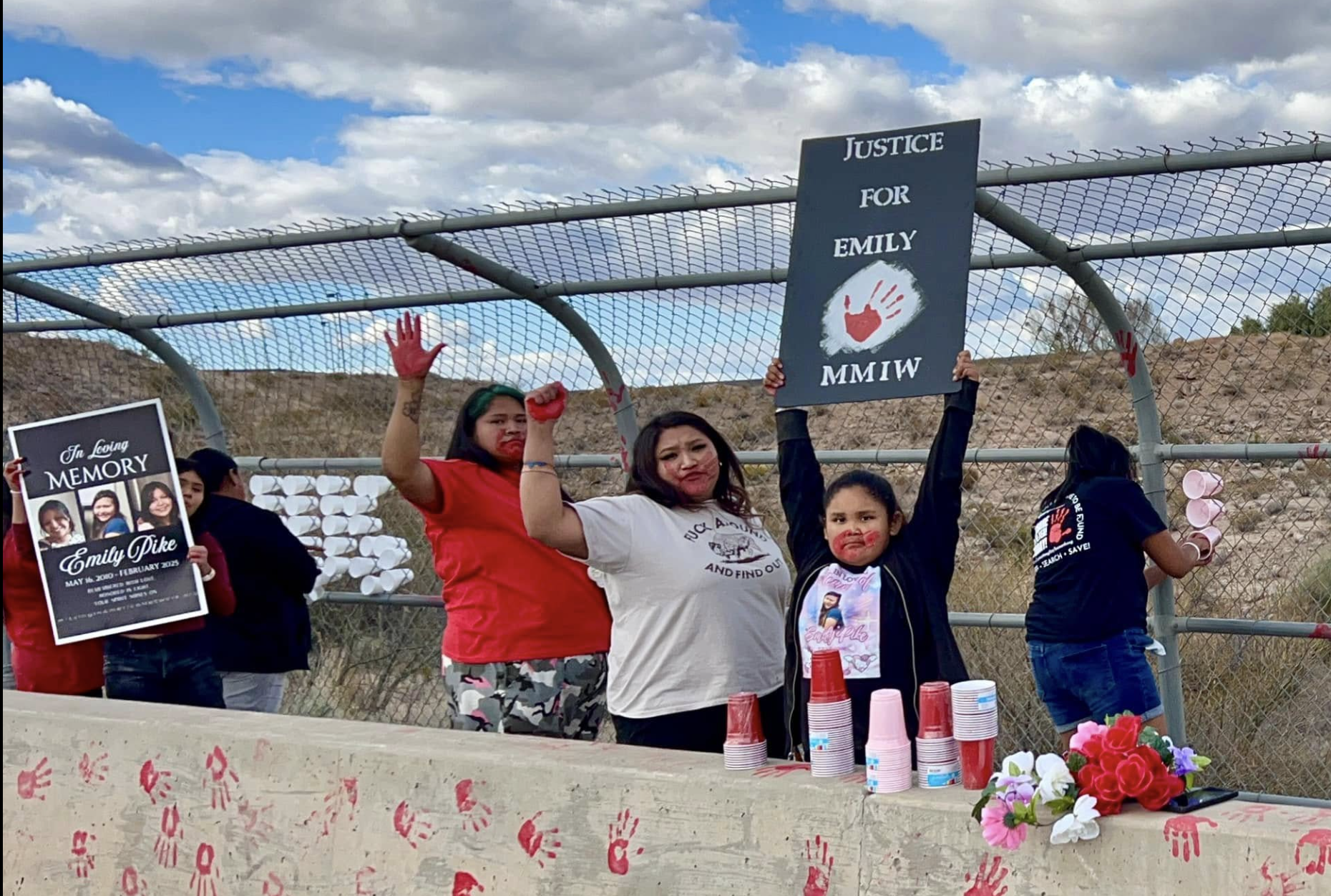
- Details
- By Kaili Berg
The San Carlos Apache Tribe is offering a $75,000 reward for information leading to an arrest in the murder of 14-year-old Emily Pike, whose tragic death has sent shockwaves through Indigenous communities nationwide.
Pike, a citizen of the tribe, was reported missing on January 27 after leaving her group home in Mesa, Arizona. Her remains were discovered on February 14 along U.S. Route 60 near Globe, Arizona—nearly 100 miles from where she was last seen.
In her honor, artists have painted a mural on a large water tank along U.S. 70 in Peridot, Arizona, on the San Carlos Apache Reservation. The artwork features a portrait of Pike wearing a red Apache camp dress, surrounded by medicinal plants significant to the San Carlos Apache people. Silhouettes of Apache warriors stand beside her, while the words “Apache Strong” appear in white, framed by a butterfly and stars.
As a final tribute, community members placed red handprints on the mural, symbolizing solidarity in the fight against the missing and murdered Indigenous women and girls (MMIWG) crisis. Emily’s mother, Stephanie Dosela, was the first to add her handprint, marking a deeply personal tribute to her daughter.
On March 14, community members in Bemidji, Minnesota, gathered at Paul Bunyan Park, dressed in pink—Emily’s favorite color—to honor her memory and demand justice. Similar demonstrations took place in Cathedral City, California, where protesters called attention to the larger MMIWG crisis.
Pike’s case has also gained widespread attention on social media, with advocates sharing images of themselves with red handprints over their mouths, a symbol of the MMIWP movement.
According to the National Crime Information Center, 5,712 cases of missing American Indian and Alaska Native women and girls were reported in 2016. However, the U.S. Department of Justice’s federal missing persons database, NamUs, recorded only 116 of those cases. A 2016 study by the National Institute of Justice further revealed that more than four in five American Indian and Alaska Native women (84.3%) have experienced violence in their lifetime, including 56.1% who have been victims of sexual violence.
Despite mounting pressure, no arrests have been made in Pike’s case. Authorities continue to investigate, and the San Carlos Apache Tribe remains hopeful that the $75,000 reward will encourage anyone with information to step forward.
More Stories Like This
Native News Weekly (August 25, 2024): D.C. BriefsNavajo Nation Mourns the Passing of Former Vice President Rex Lee Jim
Deb Haaland Earns Endorsement From Communications Workers of America Local 7076
University Soccer Standout Leads by Example
Two Native Americans Named to Democratic Congressional Campaign Committee's“Red to Blue” Program
Help us defend tribal sovereignty.
At Native News Online, our mission is rooted in telling the stories that strengthen sovereignty and uplift Indigenous voices — not just at year’s end, but every single day.
Because of your generosity last year, we were able to keep our reporters on the ground in tribal communities, at national gatherings and in the halls of Congress — covering the issues that matter most to Indian Country: sovereignty, culture, education, health and economic opportunity.
That support sustained us through a tough year in 2025. Now, as we look to the year ahead, we need your help right now to ensure warrior journalism remains strong — reporting that defends tribal sovereignty, amplifies Native truth, and holds power accountable.
 The stakes couldn't be higher. Your support keeps Native voices heard, Native stories told and Native sovereignty defended.
The stakes couldn't be higher. Your support keeps Native voices heard, Native stories told and Native sovereignty defended.
Stand with Warrior Journalism today.
Levi Rickert (Potawatomi), Editor & Publisher


